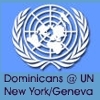

| BRIEFING - October 23, 2013 | To learn more about the Millenium Development Goals, click on the graphic Read the summer issue of the Dominicans at the UN newsletter Past Briefings: Oct 9, 2013 Sept 25, 2013 Sept 11, 2013 July 10, 2013 June 26, 2013 June 12, 2013 May 8, 2013 April 24, 2013 |
|
From food security to food sovereignty by Abby McCrary, Dominican Volunteer According to the Food and Agriculture Organization of the United Nations, approximately one of every eight people go to bed without enough food to eat. Hunger in the world is not attributable to a lack of food, but to a lack of access to food, because of insufficient purchasing power among the population or because of government policies that impede the right to food. The past 20 years of activism have framed food security as the right of all people to have enough food to avoid hunger and malnutrition, and places international agribusiness models and markets at the core. Though defeating hunger must remain the top priority, providing food is not enough. A new movement which more deeply and holistically addresses these concerns is food sovereignty. The food sovereignty concept focuses on the right of people to healthy and culturally appropriate food produced through ecologically sound methods, and their to right participate in the food systems which sustain them. If the people of a nation are dependent upon the fluctuations of the global market or the goodwill of a donor country, their food system is out of their control. The food sovereignty movement places those who produce, distribute and consume food at the heart of food systems, rather than markets and agribusiness corporations. In this way, transparency increases, and autonomous food systems which have the capacity to sustain both people and nature are reclaimed. Food sovereignty, like food security, revolves around rights. Olivier De Schutter, the UN Special Rapporteur on the Right to Food, stresses the correlation between the right to food and food sovereignty:
This participatory factor is what distinguishes food sovereignty from food security, and what makes food sovereignty such a compelling and important concept. It empowers small-holder farmers and consumers and places them at the center of the decision-making process. This inclusive, people-centered approach is deeply rooted in local production, based on the principal rights of farmers to produce the quantity and quality of food that they need to secure their livelihoods and those of future generations. For more information: Right to Food: Report by Olivier De Schutter Food Sovereignty: Global Rallying Cry of Farmer Movements People’s Food Sovereignty Now: Declaration from Social Movements/NGOs/CSOs
|
Dominican Leadership Conference
Building relationships and collaborating in the mission of preaching the Gospel
29000 West Eleven Mile Road
Farmington Hills MI 48336
248-536-3234 Contact: Executive Director

